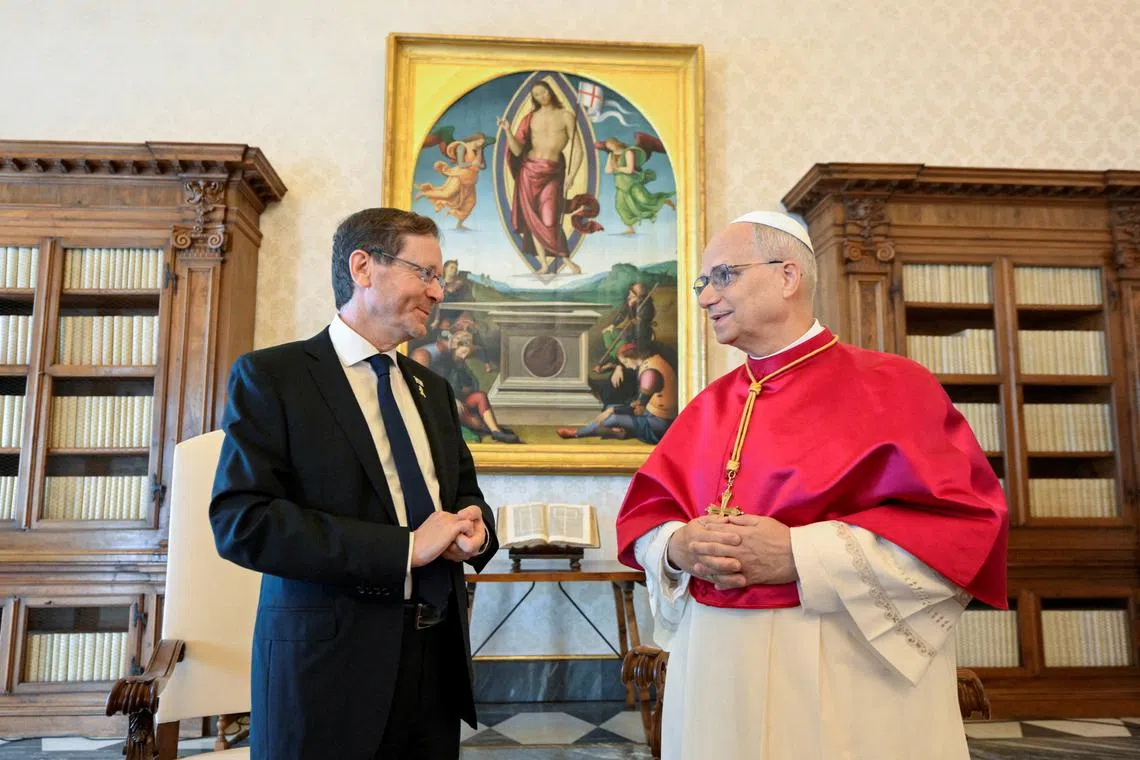With Gaza appeals, Pope Leo shows quiet but robust diplomatic style
Sign up now: Get ST's newsletters delivered to your inbox

Pope Leo meeting Israeli President Isaac Herzog at the Vatican on Sept 4.
PHOTO: REUTERS
VATICAN CITY – Pope Leo’s recent forceful statements about the war in Gaza and his strong call for a ceasefire during a meeting last week with Israeli President Isaac Herzog showed the new leader of the Catholic Church developing a robust, if quiet, diplomatic style.
Pope Leo, who became the first US pontiff when he was elected in May
Pope Francis, for example, surprised even senior Vatican officials by suggesting to a journalist in late 2024 that Israel might be committing genocide with its military campaign in Gaza, remarks that drew a sharp backlash from Israeli leaders.
Pope Leo has tended to avoid surprises in public. He favours working behind the scenes, in coordination with the Vatican’s sprawling foreign policy apparatus, and stresses in-person discussions with foreign leaders.
“Pope Francis was much more inclined to leverage the attention that he got from the media directly,” said Dr Massimo Faggioli, an Italian academic at Trinity College Dublin in Ireland who follows the Vatican.
“Leo wants to talk to the interlocutor directly... and is inclined to use the traditional channels to convey messages, knowing that people who are in the business, they will take notice,” he said.
In his weekly public audience in St Peter’s Square on Sept 3, Pope Leo made no mention of the war in Gaza. A day later, he met privately with Mr Herzog
The event, like all papal meetings with foreign dignitaries, was held behind closed doors, but the Vatican issued an unusually lengthy statement afterwards, saying Pope Leo and top Vatican diplomatic officials had lamented the “tragic situation in Gaza” with Mr Herzog.
The Vatican said they had also called for a permanent ceasefire in the Palestinian enclave, as well as the release of Israeli hostages held by the militant group Hamas.
One Vatican official, who asked not to be identified as he was not authorised to speak on the matter, said Pope Leo stressed the Vatican’s longstanding support for a two-state solution to the decades-long Israel-Palestinian conflict.
Israel’s right-wing coalition government under Prime Minister Benjamin Netanyahu rejects the recognition of a Palestinian state, in part asserting that it would reward Hamas for the October 2023 attack
“The concern has been the same but the language has been somewhat different,” Mr John Thavis, a retired long-time Vatican correspondent, said of the diplomatic styles of Pope Francis and Pope Leo.
Pope Leo is more apt to defer to the Vatican’s foreign policy experts, said Mr Thavis. “(He) has worded his appeals in the more impartial style of traditional Vatican diplomacy.”
The world’s cardinals, who elected Pope Leo, will likely give him plenty of time to develop his diplomatic style. Aged 69, Pope Leo can reasonably expect to have a papacy lasting 10 years or more.
Phone call with Netanyahu
The differences in diplomatic approaches by Pope Leo and Pope Francis were seen in July, after an Israeli strike on Gaza's sole Catholic church
Pope Francis had been close to the church. He was known since the start of the Gaza war in October 2023 to make nightly calls to the pastor, Reverend Gabriel Romanelli, to check on the community.
Pope Leo did not immediately make public comments after the July 17 strike. The Vatican instead issued a short, traditional telegram of condolences for the victims.
The next day, the Vatican announced that Pope Leo had received a phone call from Mr Netanyahu
Pope Leo appealed to Mr Netanyahu “for a renewed push for negotiations, a ceasefire and an end to the war,” the Vatican said.
The Vatican has not said whether Pope Leo has spoken personally with Rev Romanelli. The pastor did not respond to a Reuters inquiry.
No smiles for Herzog
Pope Leo showed one similarity with Pope Francis during the Sept 4 meeting with Mr Herzog.
Pope Francis, who was a gregarious figure in public audiences, sometimes did not smile in photographs with foreign leaders. One senior cardinal who was close to Pope Francis said the late Pope wanted to send signals with his facial expressions.
During a 2017 meeting at the Vatican with US President Donald Trump, who Pope Francis had sharply criticised, the late Pope showed a serious face standing next to Mr Trump, who smiled broadly.
Pope Leo, who also tends to smile when greeting people, did not smile in his photographs with Mr Herzog.
Church officials also showed a willingness last week to forego some of the Vatican’s usually strict diplomatic protocols.
While preparing for Mr Herzog’s arrival, they issued a statement to rebut the Israeli president’s assertion that he was coming to the Vatican at Pope Leo’s request.
The Vatican does not usually comment on papal meetings with foreign leaders until after they have taken place.
“They’re not letting anyone think that any government can use them as they wish,” said Dr Faggioli. REUTERS


